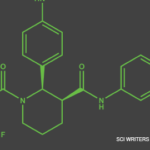
SewCream / shutterstock.com
A phase 3 trial described in The New England Journal of Medicine (NEJM) highlights the potential of a C5a receptor inhibitor, avacopan, for anti-neutrophil cytoplasmic antibody (ANCA) associated vasculitis.1 Avacopan may potentially offer a steroid-sparing option for the treatment of this serious disease.
Current Treatment of ANCA-Associated Vasculitis
Morbidity and mortality from ANCA-associated vasculitis have improved in recent decades, partly due to the introduction of newer treatments, including rituximab and other agents. Currently, most patients with severe ANCA-associated vasculitis are placed on a tapering dose of glucocorticoids, paired either with cyclophosphamide or rituximab. More recently, many patients have been placed on a remission maintenance regimen with rituximab.2
However, clinicians continue to use substantial doses of glucocorticoids for remission induction, maintenance therapy, flare management and relapsing disease. Side effects of glucocorticoid use include weight gain, diabetes, cataracts, hypertension, osteoporosis, neuropsychiatric symptoms and opportunistic infections, among others. These contribute to poor quality of life and worsen overall morbidity and mortality.
David R.W. Jayne, MD, a professor of clinical autoimmunity at the University of Cambridge and director of the Vasculitis and Lupus Service at Addenbrooke’s Hospital, Cambridge, England, is the lead investigator for the recent NEJM study. He points out another problem with current glucocorticoid-laden regimens: Patients often don’t truly achieve lasting remission. “We sort of control the disease, but if you take the kidney for example, 50% of patients still have signs of nephritis at six months on high-dose steroids and rituximab,” he says.
Shubhasree Banerjee, MD, MBBS, an assistant professor of clinical medicine in the Division of Rheumatology at the Perelman School of Medicine, University of Pennsylvania, Philadelphia, a vasculitis expert who was not involved in this study, notes that over the past few years, researchers in the broader field of vasculitis have been trying to develop treatment plans with lower doses and shorter courses of glucocorticoids.
Complement Inhibitors
The dominant role of neutrophils is one factor that distinguishes ANCA-associated vasculitis from other kinds. From work in both mouse models and human disease, we know activation of the alternative complement pathway plays a role in the pathogenesis of ANCA-associated vasculitis. C5a, produced when this pathway is triggered, activates and attracts neutrophils, which then activate more complements and neutrophils, creating a complex, positive feedback loop. Avacopan is an oral C5a receptor antagonist that selectively blocks the effects of C5a, thus blocking neutrophil attraction and activation.



